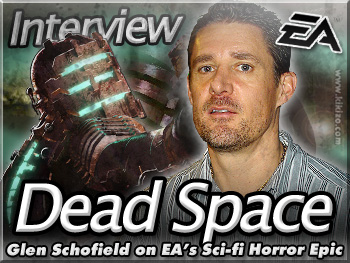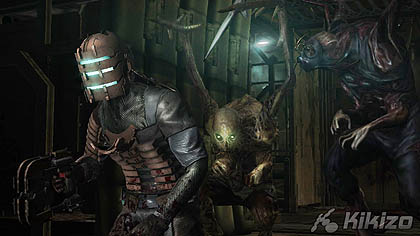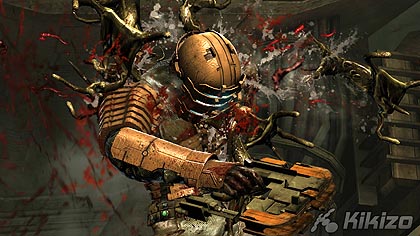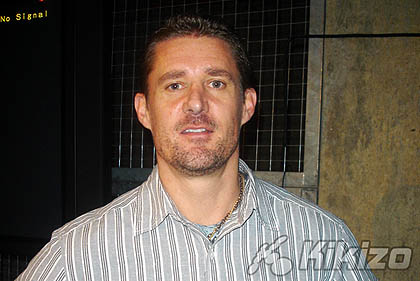Dead Space: Impressions and EA Interview
EA isn't known for original IP, but that might be about to change. We talk to EA's Glen Schofield and give our impressions of what could be this year's Bioshock.
By Adam Doree
Sometimes, when games publishers and the games media do their jobs properly, something new genuinely stands out and rapidly gains interest before it's even out. We think that Dead Space, a new brand from EA, is going to be that kind of game.

There's a level of enthusiasm in the Dead Space team so tangible, it had the president of EA sold as soon as he played a six-month concept build of what is an utterly unconventional project for the company. Yesterday, in a creepy, dark underground bunker, EA showed us the game for the first time, and it's not hard to understand why EA's top brass is now fully behind the project. We think it's down to Glen Schofield.
Schofield is Executive Producer at EA Redwood Shores, and displays those rare qualities as that can ignite real excitement in a project, even when he's addressing a handful of games media at ten o'clock in the morning. With an artistic background and eighteen years' experience under his belt, he personally assembled a team of developers and took the project to the EA boardroom. He is confident (yet not overconfident) in presenting his game to us, and daring in his vision. His voice also sounds a bit like wrestler Steve Austin's - so maybe that's helped him along the way. But we doubt it, because most importantly, his game backs him up.
Dead Space aims to keep the player in the game experience and scare him senseless, in what is perhaps a first for the industry: a survival horror game with a very strong science fiction theme. The game has an epic feel and self-assured art style, a solid technical quality and a nice palette that gives the game more than just one dull generic sci-fi look within each level. Played from a third-person perspective, the game introduces Isaac, an engineer on an unplanned mission in deepest outer space. With a HUD-less display, Isaac instead sees a holographic screen frequently appear in front of him displaying item data and data logs.
The camera pans in tightly to a shoulder view when targeting - useful, since precision is required to attack the frightful alien monsters that have overtaken the space ship, as they rapidly approach and surround you. Enemies, in general, are striking - witness the menacing 'baby' monster, as it ferociously jumps at your face with its stabby tentacles, like something from hell. A dead body is rarely dead, rather more likely to jump to life and attack with its various freaky limbs and extremities built for killing. Enemies drop through the ceiling, they burst out of other enemies, they attack relentlessly.
Dead Space also just has a lot of cool stuff. It has a full-on dismemberment system and dynamic enemy attack behaviour, it has zero gravity that makes the wall or the ceiling become the floor, it offers the ability to slow down time, it has gigantic structures (like all good spaceships) that you must use to your advantage, and for crying out loud, when you're exposed to actual space, it simulates the effect of no noise being heard, only FELT.
It also has the most horrific and painful death sequences a player-controlled character has ever been subjected to, often lasting around ten uncomfortable seconds (we've only been shown the "tamest", apparently). It's even got procedural movement on the guts hanging out of your halved torso. Beat that. It sounds like a lot. But this is survival horror, and the designers seem to understand it's all about pacing, atmosphere, and bringing it all together in the right way. We're talking massive, hour-long levels, and terror in both obvious and psychological forms.
Since this is the first time we've crossed paths with Glen, and since it seems pretty obvious that Dead Space has an awful lot of potential, we firstly wanted to know more about this man's background and how he put this team together.
![]()
Kikizo: It seems you've won a lot of trust from EA for this project. Can you tell us more about your background, and what else you've worked on up to now?
Schofield: I've been making games for about eighteen years, and I've been an executive producer of games for about twelve. I moved up through the art ranks, and management. I worked on Bond - From Russia With Love, my last game, worked on a little bit of Third Age and I was also executive producer on Return of the King, did Knockout Kings for EA... I've been at EA for about six years. Before that I was at Eidos, actually Crystal Dynamics who were bought by Eidos, I made the Gex games and all kind of stuff there. I guess I've done now about fifty or sixty games.
Kikizo: So you've handpicked this EA team for Dead Space, how did that work?
Schofield: This game started about two years ago. I went to the EA president at the time and said we wanted to make this game. We hand picked eighteen people who I'd been working with for years, and went off to work in a room for six months. We didn't come out with documents or anything, we came out with a playable demo. What I mean about hand picking, well, I started out in New York actually, working for Acclaim years ago, and when I moved out to California to work for Capcom, about ten people moved out with me; when I moved from Capcom to Crystal, about fifteen people followed; then when I moved to EA about 25-30 people came with me [laughter], so there are a lot of people I've worked with for a long time. My creative director has worked with me for twelve years, my lead animator, about ten years. You know, a bunch of these people, minimum of five, six years - and this is a game we've been talking about for a long time. Also as an artist - I was a science fiction artist - this is something we wanted to make, so there's a lot of passion behind it, and I think that's what helped sell it to the EA execs.














 Satoru Iwata Video Interview - the late Nintendo president spoke with Kikizo in 2004 as 'Nintendo Revolution' loomed.
Satoru Iwata Video Interview - the late Nintendo president spoke with Kikizo in 2004 as 'Nintendo Revolution' loomed. Kaz Hirai Video Interview - the first of Kikizo's interviews with the man who went on to become global head of Sony.
Kaz Hirai Video Interview - the first of Kikizo's interviews with the man who went on to become global head of Sony. Ed Fries Video Interview - one of Xbox's founders discusses an epic journey from Excel to Xbox.
Ed Fries Video Interview - one of Xbox's founders discusses an epic journey from Excel to Xbox. Yu Suzuki, the Kikizo Interview - we spend time with one of gaming's most revered creators.
Yu Suzuki, the Kikizo Interview - we spend time with one of gaming's most revered creators. Tetris - The Making of an Icon: Alexey Pajitnov and Henk Rogers reveal the fascinating story behind Tetris
Tetris - The Making of an Icon: Alexey Pajitnov and Henk Rogers reveal the fascinating story behind Tetris Rare founders, Chris and Tim Stamper - their only interview? Genuinely 'rare' sit down with founders of the legendary studio.
Rare founders, Chris and Tim Stamper - their only interview? Genuinely 'rare' sit down with founders of the legendary studio. The History of First-Person Shooters - a retrospective, from Maze War to Modern Warfare
The History of First-Person Shooters - a retrospective, from Maze War to Modern Warfare